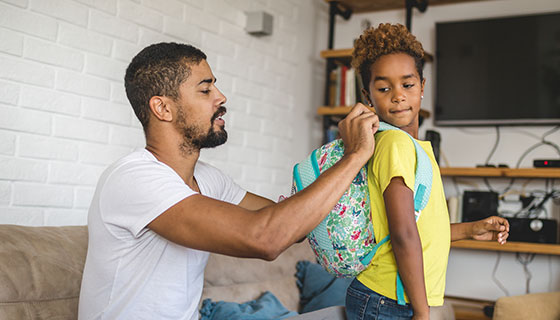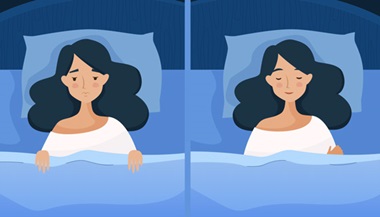COVID Depression and Anxiety
Featured Expert:
If you are experiencing depression and anxiety due to the COVID-19 pandemic, you are certainly not alone. Many are grieving loved ones who have died. Some coronavirus survivors have been left with debilitating health problems, and many others have lost jobs and businesses.
Even those who have not experienced severe loss have endured months of disrupted schedules, canceled milestone celebrations and daily logistical challenges. Little wonder so many are feeling lonely, frustrated and vulnerable, physically, emotionally and financially.
As the pandemic continues and hope for its end is in sight, there are ways to identify mental health issues and get the help you or a loved one needs. Here is some useful insight from neuropsychologist Tracy Vannorsdall, Ph.D., who talks about the impact of the coronavirus and the pandemic on anxiety and depression, what to look for and what kinds of therapy may be available to help you or someone you care about.
How the Pandemic Stresses Us Out — and Who Is at Risk
Vannorsdall says research supports what doctors are seeing in their offices. “Certainly, the pandemic is causing distress,” she says.
“There has been a general uptick in emotional distress, anxiety and depression,” she says. “We’re also seeing more patients for problems with alcohol consumption and sleep disorders, both of which help us regulate our emotions and can contribute to mood difficulties. People with preexisting vulnerabilities to mental or physical health problems are particularly at risk.”
She says patterns of anxiety and depression seem to occur in waves much like COVID-19 itself: When the number of new coronavirus cases starts to surge, so do people’s anxiety and depression. But, she adds, there are reasons for optimism.
“We benefit when we have a sense of control, the sense that we can do something to affect our situation. As more knowledge and prevention strategies such as vaccines emerge and more of life returns to normal, people may be feeling less helpless than they did earlier in the pandemic.”
4 Ways to Fight Anxiety and Depression During the Pandemic
Depression and anxiety can be serious, but both conditions are treatable. Vannorsdall emphasizes four ways to maximize your mental health and keep anxiety and depression from taking over:
- Have a routine.
When the pandemic started, many people’s days felt unstructured and monotonous, but more recently, that’s changing. “We’re getting back to a new sense or normal and falling back into a structure,” says Vannorsdall. “Compared to 2020, we are more used to being productive at home and have developed a pattern to our day with routines for work and school.” For those who are struggling, taking simple steps to regain some structure can restore a sense of equilibrium, she says. “Get up at the same time each day. Get dressed. Give yourself at least one accomplishable goal to complete each day.”
- Take care of yourself.
The mind-body connection is essential. “Engage in self-care,” Vannorsdall advises. “Prioritize good sleep, good nutrition, fresh air and exercise. Find a safe way to socialize and stay connected with friends and family.”
- Be careful with drugs and alcohol.
“Substance overuse is a risk among people who have anxiety and depression,” Vannorsdall says, adding that substance use disorder can become a serious problem in and of itself.
- Get help: It’s easier than ever with mental health telemedicine.
If you or someone you love has symptoms of anxiety or depression, help is available. In addition to in-person counseling, new options can put therapy as close as your phone or laptop.
“Telehealth has exploded,” says Vannorsdall. “That is a true silver lining of the pandemic. Teletherapy and telehealth platforms have expanded access and helped patients engage with professionals without having to physically go to a doctor’s office. It’s much more convenient for the patient, and evidence shows that it is quite effective.”
Whether you are working with a therapist or not, giving yourself some data and noticing patterns is useful, she says. “There are apps that can help you track your mood, sleep and anxiety levels, or you can keep a written diary to help you stay in tune with factors that affect your levels of sadness or anxiety.”
COVID and Mental Health: Does coronavirus infection cause depression or anxiety?
It might. Vannorsdall, who cares for patients with long COVID at the Johns Hopkins Post-Acute COVID-19 Team (JH PACT) clinic, collaborates with health care professionals from a range of disciplines to help patients recover from the long-term effects of COVID-19 and its treatment.
Severe COVID-19 can be devastating to patients. In addition to organ damage and persistent symptoms, loss of physical, emotional and even economic well-being can leave “long haulers” depressed and anxious.
Treatment in an intensive care unit, or ICU, is a risk factor, too. Post-intensive care syndrome can affect people who spend a long time in the ICU and can leave them with enduring, disabling anxiety and panic if not treated.
Vannorsdall says researchers are studying the inflammatory reactions caused by coronavirus infection and their effects on the brain. It is possible that COVID-19 itself causes physical changes that can manifest as problems with cognition — thinking, remembering and reasoning.
“One of the challenges to managing lingering COVID symptoms is how differently individuals fare with the disease and recovery. People are being treated by the PACT group for a variety of symptoms. We’re seeing elevated rates of anxiety, depression and functional decline and cognitive changes lasting several months out.
“The trajectory of recovery isn’t clear yet, but short-term interventions are working to help COVID-19 survivors, even those with persistent symptoms and physical changes.”
Vannorsdall adds that some patients treated for COVID-19 have been living with anxiety and depression since before the pandemic. “Having COVID got them into the health care system, where they can be diagnosed and treated.”
Mental Health Crisis: How can I help a friend or family member?
Everyone has bad days when sadness, lack of motivation or worry get the best of them, especially in dealing with the COVID-19 pandemic.
But, Vannorsdall points out, there are warning signs of anxiety and depression that should never be ignored:
- Talk of self-harm
- Hopelessness (believing things will never get better)
- Giving away personal items
- Inability to perform one’s normal daily activities
If you notice these in someone you know, it may be time to speak up. Vannorsdall says it’s not always easy, but she has some suggestions.
“It’s often challenging to know how to intervene in a way that a person might be open to, and there’s no one size fits all,” she says. “But sometimes you can appeal to a struggling person in terms of that one aspect of their life that they really value, such as their children, their family, their work, or something else they feel is worth getting better for.
“We often need to help reframe people’s conception of mental illness and health treatment,” she says. “People can remind themselves or their loved ones that the mind and body can’t be considered separate entities. There is an underlying biology to emotional distress. A person isn’t weak for having a mental health problem, and deserve relief as they would for any physical pain.”
Mental Health During COVID: When will things get better?
Vannorsdall says the general outlook has already begun to improve in terms of our collective well-being. “We’re getting back to a new sense of normal,” she says. “We have adapted to many changes, such as working and learning from home, and established new routines since the pandemic began.
“In the beginning, there was so much that we didn’t know. Many people felt apprehensive. Now, we realize that with vaccines and safety precautions, we can take action to protect ourselves. We are no longer totally at the mercy of this coronavirus.”






